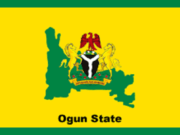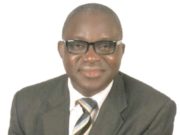Parrot Xtra’s EMMANUEL ADENIRAN recently had an encounter with Professor Johnson Kayode Adesodun, the Rector, Ekiti State College of Agriculture and Technology, Isan Ekiti. Many salient issues were discussed. Excerpts:
Our readers will like to know you and where you are coming from sir
I am the Rector, State Polytechnic by the name College of Agriculture and Technology. I am a Professor of Soil Physics from the Federal College of Agriculture, Abeokuta. I am here on a Leave of Absence as an appointee of the state government as pioneer Rector for the Institution. I am married with children. I was appointed in July but I resumed duty on the 1st of September, 2019 for this assignment.
How much of experience do you have in the area of Agriculture and Technology matters? You may wish to enlighten our readers on this sir…
Well, like I said, I am a Professor of Soil Physics from the Federal University of Agriculture in Abeokuta. In terms of experience, years of experience, I became a Professor in the year 2017, a Professor of Soil Physics and I have been working majorly in the area of Environmental Soil Science, managing the soil for different land uses; both for Agricultural and Non-Agricultural uses as a soil physicist. We deal with the physical study of soil properties in terms of managing it for sustainable use for both agricultural and non-agricultural uses. I was trained at the University of Nigeria, Nsukka in the Department of Soil Science. I also attended the university in Scotland, the United Kingdom.
Sir, moving away from that, what is the scope of activities at the Ekiti State College of Agriculture and Technology in Isan Ekiti?
Well, the College stands for training of middle level manpower. That is skills acquisition for our youths. And then it cuts across, the studies cut across different backgrounds in terms of training, because we intend to train people in all programmes of the Polytechnic as well as the new ones that are coming up. Those have just been approved. We also intend to develop some short courses, to have curriculum in short courses for different people. For example, somebody whose background is medical and wants to invest in Agriculture as well as in other Technological aspects and studies. Such people can come for short training either two or three months or less depending on the curriculum. So, that is what the college is all about. It is to produce Polytechnic graduates in skills because it’s going to be 30% theoretical and 70% practical. And then, for other non-regular Diploma programmes and certificates.
Like you know, somebody may want to start maybe bee keeping, or somebody wants to produce honey. There will be all those kinds of trainings. All those artisans’ trainings, we will want to formalize it for youths here so that they can become entrepreneurs.
Sir, we will like you to give details of the departments and faculties that we have in the institution for those in the public who are not that familiar with them.
The College, like I mentioned, is a Polytechnic and we are starting small as advised by the National Board for Technical Education (NBTE). For now, they have approved three programmes for us. That is Accountancy, Computer Science and Agricultural Technology. And we are also ready for Electrical and Electronics while Agricultural Engineering which we also call Agriculture Bio-Resource Engineering is still pending. So, the three we are starting with now are Accountancy, Computer Science and Agricultural Technology. These are to be followed almost immediately by Electrical and Electronics. We are waiting for NBTE to come and do a re-assessment of that. They came, and they assessed us for five programmes and they gave approvals for three. We see the other two remaining as take-off programmes which are Electrical Electronics and Agricultural Engineering, let me just put it that way. They are coming back for Agricultural Engineering but we are ready for Electrical Electronics. These are the programmes. So, it is going to be four now.
What is the level of your achievements in office in terms of Infrastructural Facilities on the campus?
Currently, we have a permanent site. We also had a temporary site or the annex which was an already existing School which was called Model Girls College, Isan Ekiti. But that School did not get to operation because the previous government abandoned it. So, we have adequate classrooms for those programmes starting here. We have offices. We have a library. We have hostels that can accommodate 200 students at that annex or temporary site and it is well fenced. The permanent site is currently being developed by the state government. Where we are here now is just the temporary administrative building. But we have two mighty faculty buildings going on under construction. One is almost ready and the other one would soon be ready. We also have the college library and some others like the recreation centre where construction is about to start. But here on this campus now, we have our laboratories and workshops right now. For those four programmes, there are laboratories including that of the Agricultural Engineering. Their laboratories and workshops are on this permanent site.
Sir, as the Head of the only Agricultural Institution in Ekiti State… (Rector cuts in)
It’s a Polytechnic, not Agricultural Institution. We just have the word Agriculture there because the College started as a Monotechnic. Monotechnic that is College of Agriculture before being upgraded but now, it’s a full-blown Polytechnic.
So, now, as the head of the Polytechnic in Ekiti State, what efforts are you putting in place to ensure things are right and in order on the issue of food security in the state.
We are just starting this new Polytechnic. So, when you talk about the efforts we are making to ensure food security in the state, it’s by the trainings we provide here which will increase what we call the manpower and capacity of the State. I think what we call it is Capacity Building in Agriculture and in other Technological courses we offer here. It is more of skills acquisition, more practical and a little theoretical. Here, we have a standard laboratory that can do all sorts of soil analyses even water so that farmers, the elite farmers and the other kinds of farmers who know that they need to do some land use test or whatever. They can all come here because we have the full facilities here. And with our training programmes, food security will be enhanced in the state.
So, how much of these tests has your Polytechnic carried out Sir? We will like to know if there are farmers who have come here to engage or patronize your institution.
To be honest with you, they are yet to start coming. Our laboratories are just ready now. So, we expect very shortly, that, by the time we are through with our students’ admission processes, then, we will launch into a lot of public enlightenment for people to know what we have on ground here. That will make people to start patronizing us.
For some time now, there have been some very serious attacks on farming businesses and farmers by the criminal Fulani herdsmen which has led to the destruction of so many farms across the state, the records are there, and what is going to be your expert advice to the government and farmers?
Well, my counsel to farmers, particularly to the government is that government should try as much as possible to encourage people in Agricultural Enterprise to embrace modern ways of doings things, modern technology. That is ranching. I don’t know how much Ekiti State can key into this because of land area. But as much as possible, the state government will only need to discourage what we call nomadic kind of cow farming. Because if that continues, it will continue to bring conflicts. But you know, these problems are complex. It has an international dimension and it has natural dimension. One of the natural dimensions has to do with climate change which happens when there are thrusts somewhere. When there are thrusts due to a lot of things we do, and inadequate rainfall and so on, people will begin to migrate to a more conducive environment. So, that becomes a problem. But the modern ways of doing these things is to encourage them to establish ranches. That will go a long way to solving this problem.
Sir, in your own opinion and assessment, do you think there is food surplus or food shortage in Ekiti State at this period?
Well, I will not want to say yes or no but I think, from my own observation, I think reasonably, we have enough food to consume but we might not have enough for export. Few days ago, I went for a programme at Ado Ekiti and I saw trailers coming in from the North loaded with yams and being offloaded. Even during the COVID-19 lockdown, people were still able to farm. So, I wouldn’t say there is a shortage because Nigerians are very resilient. That’s one quality of Nigerians that I so much admire and cherish. And that quality, most especially when people are very resilient, they can adapt to any situation. If you don’t manage it very well and there is a problem, they can channel it to criminal activities. So, with what is going on, I will not say that we have food shortage. That’s my personal assessment.
Sir, I am not talking about the food coming in from the North, I am talking about food being produced in Ekiti State. If we are to assess the foods we have been able to produce in Ekiti State, do you think we have enough to take care of our own needs in the state?
I don’t think so. There is no way we can have it. You get what I am saying because of the structure and the nature of Nigeria, but as per the exact situation of Ekiti State, I don’t have data for it. This is because if I want to speak on that, I should speak with data. I don’t have data for that. But what I observed generally is that foods are brought in from different places. And Nigeria’s agricultural production is seasonal. During the rainy season, you see plenty of vegetables and tomatoes and all those things being grown here but in the dry season, we see foods coming in from the North. That’s why I have to link it with what we have at the general level. So, as per the peculiar situation of Ekiti, I don’t have data. But reasonably, during the rainy season, you will see yams everywhere in Ekiti State.
With the current issues that have been happening such as vandalization and destruction of farm produce by criminal Fulani herdsmen, do you think we can still maintain the issue of food surplus in the state? Do you think we can have continuous food surplus?
No, we might not have it if such acts are not checked on time. Because if they are not checked, national food security will be adversely affected. The situation whereby people will plant, animals will just go there and feed on it and finish it up will create a lot of problems in the food supply chain. Our government has a lot to do about it. And people really need to support government and stop politicizing and bringing in religious and ethnic dimensions into national problems. So, if it continues this way, it is going to lead to a national food security crisis. And I don’t pray for such.
What do you think is the relationship and difference between Agriculture and Technology? How have you been able to reconcile the two since you were appointed as substantive Rector here?
Well, like I said, we are just starting as an Institution. This agricultural institution is a work place. If we want to make this place a real agricultural institution, it is when we have students. Those processes are ongoing. But for what we have been doing, we are just starting. Our efforts will begin to materialize in a couple of months and few years to come.
Now linking Agriculture to Technology, you know Agriculture itself is a Technology. We have Science and we have Application of Science. There are a lot of different departments or options in Agriculture from animals to livestock, there are so many ways right from planting to what we call farm gate to the point whereby people come to buy the farm produce from the farmers. So, it’s a long chain that requires technological support like mechanization, even electricity.
So, how much of this Technology do you have in this Institution?
Well, we are trying to build our mechanization drift. We presently have a mechanization centre in the college with tractors and implements. We are still building it. The mechanization centre we are building will be available for training and for commercial purposes. People can come to us to do land clearing and land preparation for them to plant. And they can come also for training to be organized by that centre. So, this is apart from what I mentioned concerning the laboratories to help do with soil and water analyses.
So, in terms of student enrolment, we would like you to give us the details. Like how many students do you have at the moment?
At the moment, we are just processing the admission of our first batch of students. We did not participate in the last 2020 UTME because at the time they were doing it, we were not yet an approved institution by the Federal Government. There are processes before we can start admitting students as a Polytechnic. Before anything, the institution must be assessed and approved by the National Board for Technical Education (NBTE). And recently, we got approval for three courses, the fourth one is being awaited. So, we are keying now into that 2020 UTME admission, there is opening for us. After the approval, we would link with JAMB. And I was at the JAMB Virtual meeting as you came. We are already on JAMB platform on their Central Admission Processes System (CAPS) portal, if you go there, just open it, you will see Ekiti State College of Agriculture and Technology. So, we are expecting now, after we are through with the admission, we are expecting a minimum of 170 students as take-off. 130 students for the already approved three programmes. And by the time we are given final approval by NBTE for Electrical Electronics, at least, they will allow us to admit a minimum of 40 students. If you take the 130 students we already had and join with this 40, so, we should be able to get around 170 or 180 students thereabout as our first batch of students.
Since you assumed office as the Rector Sir, can you give us details of your achievements in Office?
Since my assumption of Office as the Pioneer Rector, there is a way we normally call pioneers for institutions, you know. They always call us ‘wugi wupe’. Either you are a Vice Chancellor or whatever, you come to a virgin land as a pioneer, you will start building structures, land clearing, doing a lot of things unlike an already existing institution. So, what I have been doing so far is to put structures and protocols on ground. Like some building that are going on now and staff recruitments; we have recruited the first sets of staffs. Some other projects too are going on here. And very shortly, we expect our first batch of students to come in. What I have been doing is to set this institution up. Structures, that is infrastructure has taken off. Human resources to drive the system are in place and then, the students that we expecting to come.
Has there been any research work or invention by the institution or its staff since you came on board?
Not yet. But we have a lot lined up; lot of linkages and collaborations with some national and international organizations which we are pressing on. But most of all these collaborations and support that might come, they want to see that we have students because this is an Educational Institution. Without students, it is not going to be easy. It’s not a Ministry. The students are the main target for the Human Capacity Development. So, that is why we are so serious now about getting our students in and then we build on that.
What about bringing on board new ideas? Do you have new ideas that you are already ruminating over?
Yes, we have a lot. Not only from me but from the staffs and also from the different groups that want to come in. We have our Entrepreneurship Centre and already, a lot of proposals are coming in on some things that some people want to do here. Like I mentioned, we are just starting. We will get there. In the next one year, we should be able to see some changes.
Equally, sir, we would like to know what kind of relationship exists between this institution and the Isan Ekiti community…
The relationship between the institution and Isan Ekiti Community has been very cordial especially with the fatherly support of the Kabiyesi, the Onisan of Isan Ekiti even when we had some issues. You know there has always been this kind of ‘Omo Onile’ of a thing that the state government has not paid compensations. The Kabiyesi has always been equal to the task. So, generally, it has been cordial. And you know this institution is going to bring a lot of development to Isan Ekiti. They are the primary beneficiary of this institution. The moment staff and students come, you know, Isan Ekiti will be the first beneficiary.
Since you came on board, from then till now, how much have you gotten from the state government in terms of Naira and kobo, like grants and support?
The state government has been trying its best. It has been supporting us with monthly grants as state intervention. We get it regularly. And there are capital projects going which are being sponsored and provided by the state government. EKSG have been trying its best but the only thing that has been hindering us is this COVID-19 problem. The state government has a lot in the pipeline for the institution. It was the COVID-19 problem that affected the world economy that also had a negative effect on the state government. But so far, the state government has tried. Our laboratories and all the equipment were provided for the institution by the state government. Also, the faculty buildings that are going on are by the state government. Other ongoing projects too are sponsored by the state government. We are yet to get TETFUND support because the major condition for that lies in the students’ admission. TETFUND will want to see that we are admitting students because they will come and verify as a Polytechnic before we can qualify for TETFUND Intervention.
Then, let me just mention this, this Institution is a state Polytechnic. The only one by the Ekiti State government so far. And the TETFUND interventions are for Universities, Polytechnics and Colleges of Education. With this State Polytechnic, Ekiti State will now begin to benefit from TETFUND Support and for middle level manpower and trainings because without these institutions, there has been zero interventions as far as Ekiti is concerned. So, Ekiti State has been losing those interventions.




































































